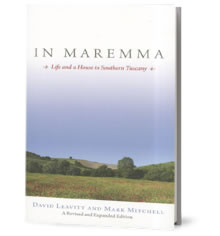Non-Fiction
IN MAREMMA: LIFE AND A HOUSE IN SOUTHERN TUSCANY
A Revised and Expanded Edition (Co-authored with Mark Mitchell)
COUNTERPOINT, 2011
Now with illustrations and photographs, this new edition of In Maremma recounts the restoration of a dilapidated 1950s farmhouse in southern Tuscany and the process by which the authors became initiated into a part of Italian life foreigners rarely see. The pleasures of the olive harvest and picking wild asparagus are juxtaposed with the vagaries of political corruption and self-perpetuating bureaucracy. Landscape and weather provide the stuff of reverie, as do the benefits of boredom and the longing for peanut butter. A celebration and exploration of a little-known part of Italy, In Maremma provides a fond, if sometimes critical, corrective to other more rapturous portrayals of Tuscany.
BUY Amazon barnes & noble indiebound
ON In Maremma
“‘The most useful thing anyone living in Italy can learn is how to be bored.’ Unlike Peter Mayle and his love-hate relationship with France, David Leavitt and Mark Mitchell take their fascination and love for Italy very seriously. I imagine that they are less obtrusive in their village in southern Tuscany, more realistic about the lives of expatriates than Mayle ever was. They are honest about what they love and what they don’t love, as well as about what they miss (peanut butter, for example, and BLTs). They write about the Italian bureaucracy with a kind of horror and with many references to fascism. ‘There is no charm in any of this,’ they write about getting a driver's license. ‘Every garden has its Lucifer, and it is well to lose the innocence that conceals the truth.’ Still, they remind a reader of E. M. Forster characters, drawn with a backdrop of Italy, even as they protest that ‘Italy has a way of refusing to remain only in the background.’ The lovely effect this has is that you don’t yearn to uproot your entire life and move to Italy, as some of us might after reading Mayle's accounts of France. Instead, you drive down your own Main Street in the morning, wherever that might be, and you notice the people having their cappuccino outside. You notice the people washing their cars at the local carwash. You watch yourself drop off your own children at school as if, for one glorious moment, you were a traveler, a tourist, a visitor, a foreigner. The mundane is made charming. Priceless.”
—Susan Salter Reynolds, The Los Angeles Times Book Review
“In Maremma is a loosely gathered bundle of memoir-essays…Unlike [Gore] Vidal, who seems to define his Italian life by his endless stream of boldface visitors (Tennessee Williams, Truman Capote, Jackie Kennedy, ad infinitum), Leavitt and Mitchell sink into their surroundings, befriending Pina, the local restaurateur, Andrea the butcher, and a passel of local laborers and farmers. One favorite chapter, ‘Frantoio,’ provides a lovingly concise look at the local olive harvest and the pressing of olive oil. It’s full of the exact sort of fascinating industrial detail that, while decidedly less rustic, made Arthur Hailey’s books about banks and airports and hotels so enthralling. Of course, the writing here runs inky rings around those potboilers: the town's legendary ancient olive tree is a ‘green mother, whose milk tastes like pepper.’…The couple's warm evocations of daily life in the Maremma region (the word means marsh, but the landscape is actually rough, scrubby sheepherding terrain) are charming, and the relaxed philosophical musings that emerge from time passed without the sensory bombardment of so-called civilization are poignantly insightful.”
—Jim Gladstone, The Lambda Book Report
“Written in short anecdotal essays with such titles as ‘Sheep Jams,’ ‘Boredom,’ and ‘Cooked Water' Leavitt and Mitchell render their initiation into small-town Italian life with humor and celebration. Maremma is not the Italy most Americans know. It is the poorest province in Tuscany, and the house the men buy is not the lovely villa often photographed and viewed with envy…And yet, once they decide to buy it, Mitchell and Leavitt set to it—they do not dwell on the negative, they dive headlong into their new life…Not all of the essays are about the house, per se. The authors give us that rare opportunity to experience rural Italy along with them. Olive harvesting, wild-asparagus hunting and getting an Italian driver’s license are but a few of the subjects we get to explore. Collaborating authors sometimes have a difficult time keeping a fluid narrative; often the voices fluctuate. Not so in this case. The narrative voice of In Maremma is consistent, never reminding the reader she is reading and not actually experiencing the events. Reading In Maremma is like taking a vacation. While not all the moments are sunny and simple, you are taking a welcome journey away from your own daily existence and when it’s over you wish there were more.”
—Marika Brussel, The New Mexican

Foreign Editions
De Harmonie (The Netherlands)
Peninsula (Spain and Latin America)
